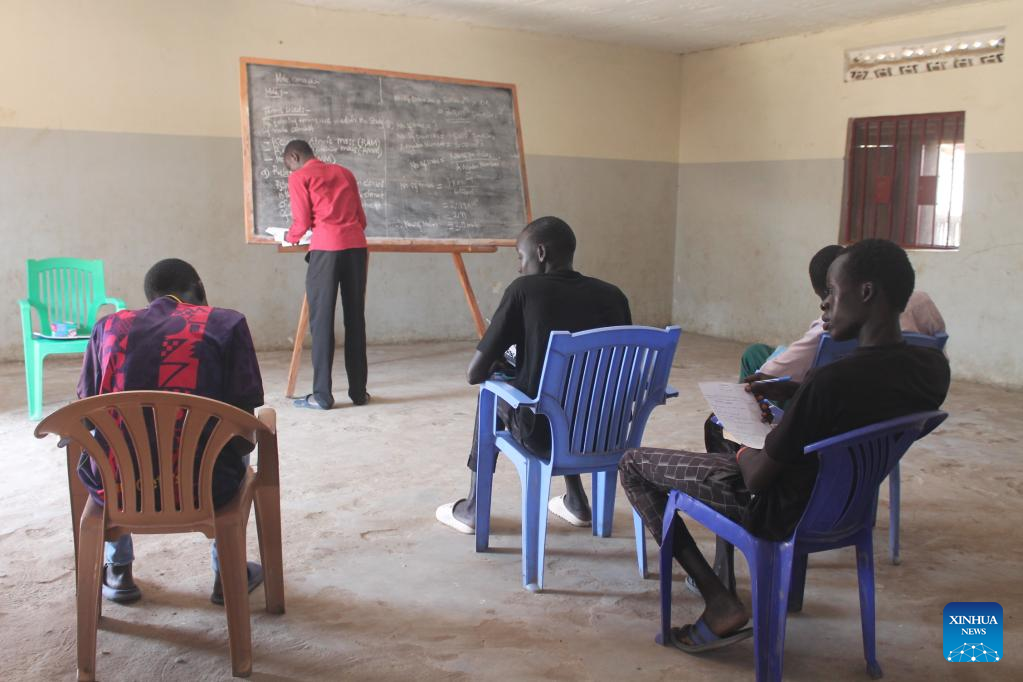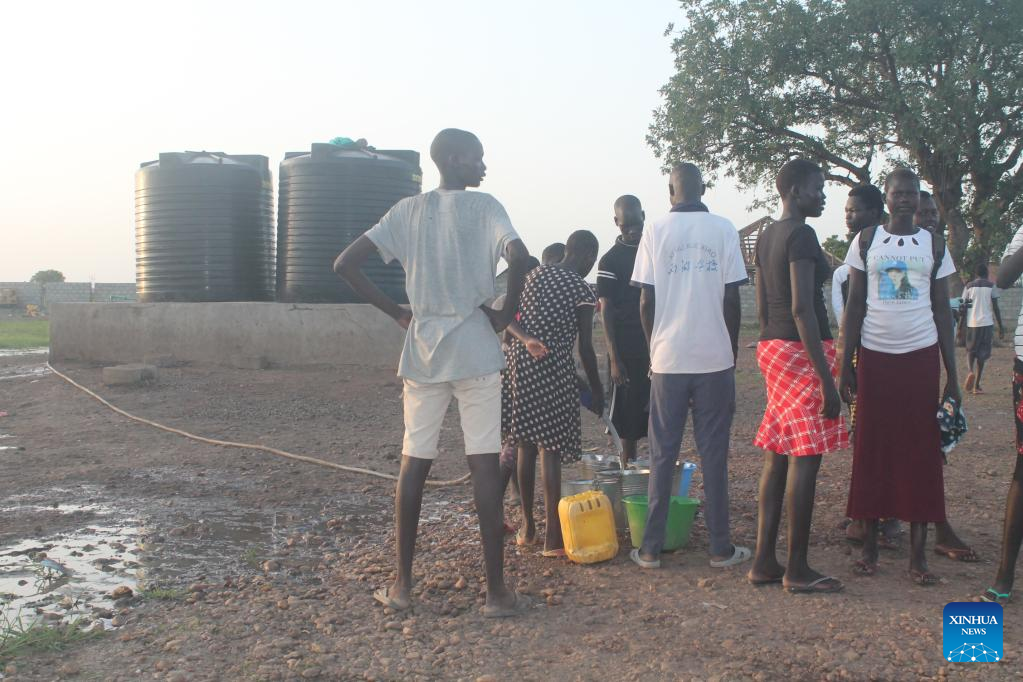
Orphans attend class in one of the classrooms of Stone Orphanage Home in Juba, South Sudan, June 5, 2022. (Photo by Denis Elamu/Xinhua)
JUBA, June 7 (Xinhua) -- The legacy of war in South Sudan is particularly reflected in the lives of its most vulnerable victims including women, children, and the elderly.
Nevertheless, a good number of these unaccompanied children are slowly being transformed into responsible citizens at Stone Orphanage Home, dedicated to the mission of restoring the shattered social fabric of the world's youngest republic.
Gatjang Khor Deng, a 15-year-old boy, escaped conflict in Unity state in 2020 and arrived in Juba, the capital of South Sudan, unaccompanied and with nowhere to find shelter. Khor is among the more than 1,300 children who either lost a parent or both immediate caretakers during the two wars in 2013 and 2016, respectively.
He said that his stay at Stone Orphanage Home, overseen by Peter Ayual Deng, has helped build strong social bonds with children from other ethnic communities that could have been impossible due to hostilities and mistrust which thrived amid years of conflict.
Khor lost his mother to the conflict in his native Unity state, adding that his surviving father could not offer him basic needs such as food and education.
"In Unity State, there is no peace and there is no good education," Khor told Xinhua at the orphanage in the Gudele suburb east of Juba during a recent interview.
Richard John, 12 from the Parjok area of Magwi County in Eastern Equatoria state, lost both his parents during the 2013 conflict that erupted between troops loyal to President Salva Kiir and those of his then Vice President Riek Machar.
John is currently staying with two of his brothers at the orphanage where he finds solace from his numerous friends from different South Sudanese ethnic groups. He was not yet in school when his parents were alive but now he is studying in primary three at the school run by the management of the orphanage.
John's future could have been bleak had he not sought refuge at the orphanage.
"I find this place very good because all of us from different ethnic communities of South Sudan are well represented here," John said.
About 15 widows are living alongside the orphans for whom they help prepare meals and render other essential support.
Ayual, the overseer of Stone Orphanage Home, said that he initially envisioned accommodating 30 orphans in 2014 when the orphanage was established but currently the number has spontaneously grown over the years, as more children turn up every week at the orphanage.
The orphanage is in urgent need of more support in form of food, shelter, and medicines to maintain the ever-growing number of unaccompanied children arriving at the orphanage.
"We need enough food, I do not want to go back home because of insecurity in Unity state," Khor said.
Ayual said President Salva Kiir provided them with free land where the orphanage is hosted and money to build some permanent shelter for the orphanage. He admitted that they need more support from donors and international humanitarian agencies to maintain the operation of the orphanage since they expect the number of children to rise to 5,000 by 2023.
South Sudan which won independence from neighboring Sudan in 2011 has about 64 ethnic groups.
Ayual revealed that the majority of these orphans are children of fallen soldiers during the past two conflicts.
"Most orphans we received all these years were children of fallen soldiers who passed on during the wars in South Sudan. They were from the greater Bahr El Ghazal, Upper Nile, and Equatoria regions," said Ayual.
Rebecca Machar Majok, 12 from Rumbek East of Lakes state, also lost her soldier father due to illness while he was on the frontline during the civil war.
Majok said she is grateful to the orphanage for giving them a second chance in life.
"I do not want to get married at a young age before completing my studies. When I grow up I want to be a businesswoman so that I can help orphans like me," Majok said. "I find this place peaceful and calm compared to the intermittent sub-national conflicts in the countryside, in this place, there is no tribalism, nepotism, and favoritism, all of us are living here together in harmony."
Anitah Peter, 12, left the Yambio region of Western Equatoria state in 2020 following the death of his parents during the renewed violence of 2016. He said that before coming to Juba he had never heard of other ethnic groups outside of his Yambio territory.
"I see all children at this place as my brothers and sisters," Peter said.
In 2018, the UN Children Fund (UNICEF) revealed that about 15,000 children in South Sudan were separated from their families or missing due to conflict.
The Chinese Embassy in Juba this year extended support to this orphanage, including sinking new deep water well called the China-South Sudan Friendship Well, which is capable of providing enough water for the daily life of the 1,300 orphans in the orphanage, as well as donating several bags of essential food. ■

Orphans fetch water at the China-South Sudan Friendship well in Stone Orphanage Home in Juba, South Sudan, June 5, 2022. (Photo by Denis Elamu/Xinhua)



